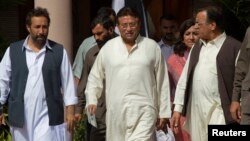ISLAMABAD, PAKISTAN —
Pakistan’s former military ruler Pervez Musharraf, who recently returned to his homeland after more than four years of self-imposed exile, has been barred from running in the upcoming parliamentary elections.
Musharraf had applied to contest the May 11 polls from four Pakistani districts because a candidate is legally allowed to run for multiple seats simultaneously.
Earlier this month, election officials in three of the constituencies rejected his nomination papers for suspending the country’s constitution and sacking top judges of the Supreme Court. An officer in the northern district of Chitral, however, cleared him to participate in the upcoming elections.
On Tuesday, that decision also was overturned by a higher court. A senior party leader and legal advisor, Ahmed Raza Kasuri, told VOA that Musharraf’s bid to make a political comeback is not over because he can appeal the decision to the country’s Supreme Court.
“We are going to file appeals against all the four decisions. We want to complete the cycle of justice," said Kasuri. "We want to give the message to the world at large that the person whom they called dictator, he came voluntarily without the warrant of arrest or any summons from any court to stand by the people of Pakistan.”
As the chief of Pakistan’s powerful military, Musharraf staged a bloodless coup in October 1999 to seize power. He went on to rule the nation of 180 million for nearly a decade, declaring himself president - a move later endorsed by his supporters in parliament. Following his supporters' defeat in the 2008 elections, however, Musharraf was forced to step down to avoid impeachment. He left the country a few months later.
Since his return to Pakistan last month, though, the 69-year old former Pakistani leader has faced a number of political and legal difficulties, in addition to Taliban death threats.
The Supreme Court is hearing several petitions from lawyers demanding that former general Musharraf be tried for treason for violating the constitution. He also faces court proceedings linked to the December 2007 assassination of former Pakistani leader, Benazir Bhutto.
Musharraf had applied to contest the May 11 polls from four Pakistani districts because a candidate is legally allowed to run for multiple seats simultaneously.
Earlier this month, election officials in three of the constituencies rejected his nomination papers for suspending the country’s constitution and sacking top judges of the Supreme Court. An officer in the northern district of Chitral, however, cleared him to participate in the upcoming elections.
On Tuesday, that decision also was overturned by a higher court. A senior party leader and legal advisor, Ahmed Raza Kasuri, told VOA that Musharraf’s bid to make a political comeback is not over because he can appeal the decision to the country’s Supreme Court.
“We are going to file appeals against all the four decisions. We want to complete the cycle of justice," said Kasuri. "We want to give the message to the world at large that the person whom they called dictator, he came voluntarily without the warrant of arrest or any summons from any court to stand by the people of Pakistan.”
As the chief of Pakistan’s powerful military, Musharraf staged a bloodless coup in October 1999 to seize power. He went on to rule the nation of 180 million for nearly a decade, declaring himself president - a move later endorsed by his supporters in parliament. Following his supporters' defeat in the 2008 elections, however, Musharraf was forced to step down to avoid impeachment. He left the country a few months later.
Since his return to Pakistan last month, though, the 69-year old former Pakistani leader has faced a number of political and legal difficulties, in addition to Taliban death threats.
The Supreme Court is hearing several petitions from lawyers demanding that former general Musharraf be tried for treason for violating the constitution. He also faces court proceedings linked to the December 2007 assassination of former Pakistani leader, Benazir Bhutto.




